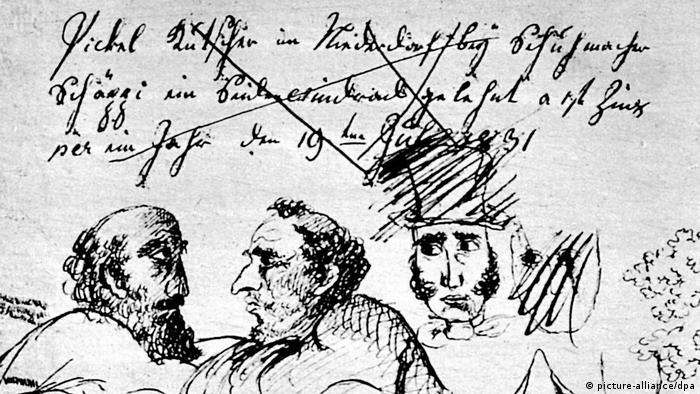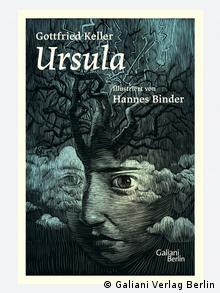https://en.wikipedia.org/wiki/Gottfried_Keller
Works in English translation[edit]
- Legends of Long Ago (1911, translated by Charles Hart Handschin).
- Seldwyla Folks (1919, translated by Wolf von Schierbrand).
- The People of Seldwyla, and Seven Legends (1970, translated by M.D. Hottinger).
- A Village Romeo and Juliet (1952).
- Green Henry (1960, translated by A.M. Holt).
绿衣亨利(上)_百度百科
绿衣亨利(上)作者介绍. 编辑. 凯勒(Keller Gottfried 1819~1890)瑞士德语作家,1819年7月19日生于苏黎世。其第一部《诗歌集》是一部政治抒情诗集。1883年出版的《诗集》收进自己所写的最优秀诗篇。他的诗把浪漫主义和现实主义的优秀传统融为 ... - Martin Salander (1963, translated by Kenneth Halwas).
- Two Stories (1966, edited by Lionel Thomas).
- The Banner of the Upright Seven, and Ursula; Two Novellas (1974, translated by Bayard Quincy Morgan).
- The Misused Love Letters & Regula Amrain and Her Youngest Son; Two Novellas (1974, translated by Anne Fremantle and Michael Bullock).
- Perspectives on People: Five Stories (1977, translated by Lawrence M. Washington).
- Stories (1982, edited by Frank G. Ryder).
主な作品[編集]
- 1846年 詩集 (Gedichte)
- 1851年 新詩集 (Neuere Gedichte)
- 1853年-55年 緑のハインリヒ (Der grüne Heinrich)
- 1856年 ゼルトウィーラの人々 (Die Leute von Seldwyla) 第1巻
- 顰め面のパンクラーツ (Pankraz, der Schmoller)
- 村のロメオとユリア (Romeo und Julia auf dem Dorfe)
- アムライン夫人とその末子 (Frau Regel Amrain und ihr Jüngster)
- 三人の律義な櫛職人 (Die drei gerechten Kammmacher)
- 仔猫シュピーゲル (Spiegel, das Kätzchen)
- 1872年 七つの聖譚 (Sieben Legenden)
- 1873年-74年 ゼルトウィーラの人々 (Die Leute von Seldwyla) 第2巻
- 馬子にも衣裳 (Kleider machen Leute)
- 幸運の鍛冶屋 (Der Schmied seines Glückes)
- 恋ぶみ濫用 (Die mißbrauchten Liebesbriefe)
- ディーテゲン (Dietegen)
- 失われた笑い (Das verlorene Lachen)
- 1877年 チューリッヒ短編小説集 (Züricher Novellen)
- ハートラウプ (Hadlaub)
- マネックの阿呆者 (Der Narr auf Manegg)
- グライフェン湖の代官 (Der Landvogt von Greifensee)
- 七人の正義派の小旗 (Das Fähnlein der sieben Aufrechten)
- ウルズラ (Ursula)
- 1879年-80年 緑のハインリヒ (Der grüne Heinrich) 改作
- 1881年 寓詩物語 (Das Sinngedicht)
- 1883年 Gesammelte Gedichte
- 1886年 マルティン・ザーランダー (Martin Salander)
- 1889年 Gesammelte Werke
BOOKS
Gottfried Keller at 200: An enduring literary legacy
Revealing the suffering of the "bourgeois outsider," the Swiss poet and novelist is considered one of the 19th century's great European literati whose works are highly relevant today.
"When viewed superficially, one can sometimes actually believe that his works are songs of praise for the Swiss bourgeoisie," says Ulrich Kittstein, referring to the 19th century writer and poet Gottfried Keller. But the professor of modern literary history in Mannheim adds that these stories, especially his pioneering German "novel of education" Green Henry (1855), also exposed the broken dreams of young people in a capitalist society.
Marking the 200th birthday of Gottfried Keller (1819-1890), Kittstein has released a voluminous biography on the German-language literary giant who followed in the footsteps of Goethe but developed a style all of his own.
Born on July 19, 1819 in Zurich to a master woodturner Rudolf Keller and his wife Elisabeth, Gottfried grew up in poverty after his father's early death. Encouraged by his mother to pursue his own calling, he initially followed his passion for drawing and painting before moving to Berlin and taking up writing. During his six years in the Prussian capital, Keller penned the semi-autobiographical coming-of-age novel, or "Bildungsroman," Green Henry, about the struggles of a young artist.
Kittstein says the novel exhibits an impressive writing aesthetic and art of storytelling. "With a few strokes, often with very few sentences," he says, Keller created "scenes that are incredibly memorable and vivid."
Master of the novella
Keller's subsequent work includes political writings, essays, plays and novella collections like The People of Seldwyla (1856-74). Writing about the latter on the New Books in German website, Rüdiger Görner, professor of German with comparative literature at Queen Mary University London, wrote that the collection "displayed his narrative virtuosity at its most staggering." In it, Keller described the goings on in Seldwyla, an imagined Swiss provincial town full of "foolish and petty vanities, but a place where tragedy can also strike."
"It was Walter Benjamin who first hailed the Swiss novelist," Görner also noted, "as a figure of Homeric proportions." Keller's "thematic scope, his style, his inventiveness and his attention to detail," plus his mastery of "disparate fields of caricature, satire and fantasy" were still underappreciated by readers outside the German-speaking world.
Critique of capitalism
Citing works such as the Zurich Novellas (1877) — which include Ursula, a love story of a Swiss soldier and a farmer's daughter during the Swiss Reformation — some have accused Keller of a stodgy bourgeois realism. But Kittstein points to Keller's implicit critique of the broader social and economic system.
"There are always characters in his works who are making money, earning tremendous wealth without doing any useful work, simply by taking advantage of the complex structures of the capitalist economy and through tricks and intrigues to make a profit by manipulation, by pure swindling," he told DW.
Above all, Keller always asked meaningful questions in his books about how one might achieve balance between "individual demands and social requirements." It's a universal question which, 200 years after the author's birth, still commands our attention.




沒有留言:
張貼留言